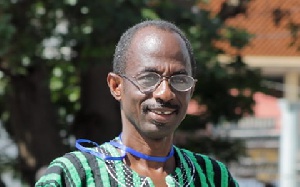The dialogue regarding the disbandment of political vigilante groups in the country must bring on board, mediation and security experts, members of the Judiciary and security agencies, General Secretary of the opposition National Democratic Congress (NDC), Johnson Asiedu Nketiah has suggested.
According to him, the inclusion of the aforementioned persons and groups together with civil society organisations (CSOs) will help bring out the best road map to dissolving the dangerous groups also known as party militias.
The NDC chief scribe made this known when he appeared as a guest on Inside politics, a political talk show on Radio XYZ 93.1 hosted by Mugabe Maase.
Explaining the reason behind his suggestion, Mr Asiedu Nketiah observed that after the National Peace Council (NPC) invited his party and the leadership of the ruling New Patriotic Party (NPP) to meet on how to disband the vigilante groups, he noted that the matter could not be thoroughly resolved without some other stakeholders whose expertise could go a long way to help the dialogue.
“There are people who are experts in mediating meetings of such nature; they can be brought on board to help mediate the process under the auspices of the National peace Council because that is their field,” he remarked and noted that the roles of such persons can never be underestimated in such crucial meetings.
Mr Asiedu Nketiah expressed the NDC’s commitment to disband vigilante groups within the country’s political space, but hastened the inclusion of other stakeholders such as security experts and state security agencies would provide the platform for them to bring their experience to bear on the shaping of decisions the parties will arrive at.
“These security agencies and security experts, as well as our judges, can help in the dialogue. The security experts can tell us from their researches how other countries who encountered such groups dealt with them. The judges can also help us know how they goa about issues of that nature and expose the lapses in the court processes that can hinder the prosecution of persons in such groups,” he explained.
Vigilante Meeting
The National Peace Council (NPC) met the NPP and NDC in Accra and held discussions with them on how to disband party militia affiliated to them.
The process which was mediated by the National Peace Council was necessitated by a directive from President Nana Akufo-Addo to the two parties to dialogue on the matter following the violence that marred the Ayawaso West Wuogon by-election on January 31, 2019.
About 6 NDC supporters sustained various degrees of gun wounds after they were attacked by masked men suspected to be linked to the NPP – a situation that made President Akufo-Addo establish a three-member commission led by former boss of the Commission on Human Rights and Administrative Justice (CHRAJ), Francis Emile Short to inquire into the nefarious act.
Last month, the Emile Short Commission had submitted its report to the president for further action after it invited stakeholders and witnesses over the election-related violence.
The perpetrators of the violence during the bye-election who were captured live on videos are still walking free despite an ongoing police investigation.
Vigilante Bill
Mr Asiedu Nketiah’s remarks come days after the government laid in Parliament legislation to deal with the formation and operation of vigilante groups.
The bill known as ‘Vigilantism and Related Offences Bill, 2019’ was laid in Parliament on Thursday, April 11, 2019, under a certificate of urgency.
It was laid on behalf of the government by the Attorney-General and Minister for Justice, Gloria Akuffo and was referred to the Committee on Constitution, Legal and Parliamentary Affairs by the Speaker of the House, to consider its urgency or otherwise and report same to the plenary for consideration.
The bill is proposing a 10-25-year prison term for anyone who participates in the activities of political party vigilantism with an offensive weapon.
Clause 3 of the legislation prohibits the formation, organization, operation or promotion of the formation, organization, operation or activities of a political party vigilante group. The clause further prohibits membership of a political party vigilante and participation in the activities of a political party vigilante group.
Politics of Tuesday, 16 April 2019
Source: myxyzonline.com













